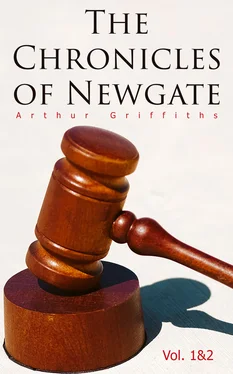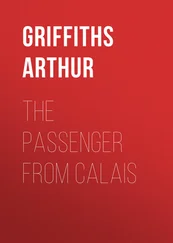Offences against morality and religion were met with the same penalty of imprisonment. Incontinence and loose living were high misdemeanours. In an extract from the register of the High Court of Commission we find that Nicholas Slater of Royden, Essex, a married man, had run off with Blanche Cowper, another man’s wife. Defendants lived together in various places. “Slater, like a vagabond, without license had wandered up and down the kingdom professing physic and surgery, and carried Blanche about with him from place to place.” Slater was committed close prisoner to Newgate, there to remain during pleasure, and Blanche to Bridewell. There was added penance in Ware and Stepney, while Slater was fined £1000 and Blanche £100 to His Majesty. The last part of the sentence points to Charles’s shifts to raise money. This was in 1638. Another story of the same kind, but with a different issue, is of the same date. George Harrison in Newgate petitions the Archbishop of Canterbury and the Lords of the High Commission Court for enlargement. A certain John Cock had, it appears, discovered the incontinent life of John Thierry and Ursula Baythorpe. The latter offered Cock £27 to be silent, which he was willing to accept, and went with the petitioner Harrison to a tavern, the place appointed for the handing over of the money. But they fell into a trap, and were arrested at the tavern; thence they were carried to the Compter and committed to Newgate. Afterwards at a sessions they were indicted, and, on the testimonies of the merchant and the said Ursula’s sister and her husband, were whipped three times to the pillory, where they stood eleven hours. They were not suffered to come down till they had asked Thierry’s and Ursula’s forgiveness before all the spectators, and so were three times whipped back again. “By the extremity of which execution petitioner lost his speech and almost his understanding, and Cock was carried home dead in the cart. By which cruelty and disgrace petitioner, who was formerly well respected, is now utterly undone.” Thierry must have had good friends at court. But the informer seems to have been right in his denunciation, for both the accused were subsequently “detected to the court,” and it was proved that the said poor men had only suffered for “meddling with the truth.” Petitioner now prays that the merchant (Thierry) may be ordered to give him and his poor children relief and restitution for their sufferings.
A quaint pamphlet entitled ‘Strange News from Newgate,’ dated 1647, states that on the 10th January, “being the blessed sabbath, at Botolph’s Church near Bishopgate, in sermon time, there arose a great disturbance by one Evan Price, a tailor, who stood up and declared himself to be Christ, which words much amazed the people, and divers timorous spirits into a great fear. … Whereupon he was immediately apprehended and carried before the Right Honourable the Lord Mayor, where he was examined seriously and at length, although no doubt a religious lunatic.” He was asked whether he had worked miracles, whether he was married, … “with divers other arguments objected against him, which he was not able to answer, but remained obstinate in his devilish and satanical opinion.” But after some time spent upon his examination, “as he still remained in his hell-bred opinion, not hearkening to any advice or counsel whatsoever,” it was ordered that he should be committed to Newgate, which was accordingly performed. “Five days later he was arraigned at the Old Bailey, and coming to the bar, was examined by the judges, but seemed resolute not to make any confession.” The pamphlet ends abruptly, and does not give the result of his trial.
It must have been consequent on some conflict with the ecclesiastical authority that Edward Powell, alias Anderson, was sent from Ely as a prisoner to Newgate. The story rests on a report from Bishop Wren of Ely to the council, dated 5th June 1638. Powell had been apprehended upon a riot committed by an assemblage which went by the name of Anderson’s Camp, but was not imprisoned for his share therein, but for his misdemeanours and foul speeches at the time of arrest. He was accused of being an abettor of the riot, although not present at it. When he had been at Newmarket the previous Lent, Powell paid the town-crier twopence to proclaim a gathering of the people to go to the king with a petition about their fens; “for the losing of the fens would be the losing of their livelihood.” Upon this Powell was summoned before Mr. Justice Goodrick, but denied the charge. Next day Mr. Goodrick, going into the market-place, found a crowd there with cudgels in their hands, and Powell with them. Powell, interrogated, asked whether the king’s market was not open to all, and rejoined his company. As the result of these disturbances, Powell was arraigned and sentenced to a fine of £200, and to be imprisoned, and “now lies in execution for the same. Since his removal from the prison at Ely to Newgate, the poor people are very quiet and in good order.” Powell from his captivity addresses his “loving friends and neighbours in the city of Ely, and others,” in letters which were seized. In these he expresses a hope of deliverance when the king comes to London, and that he has refused to give up his friends’ names, whereby they might be fined and imprisoned, although daily urged to do so by fair offers and large promises, and also by threatening language, terrible speech, and protestation of perpetual imprisonment. He then asks these friends to make a collection for him and his family, and gives a dark picture of his prison—“this loathsome gaol, in which we are accompanied with noisome stinks, cold, lousy to dying, and almost all other miseries.”
There is nothing especially remarkable in the purely criminal cases of this period; offences have a strong family likeness to those of our own day. Culprits are “cast” for “taking a chest of plate out of a house;” for “taking £100 from a gentleman,” and so forth. Now and again appears a case of abduction, a common crime in those and later days. Sarah Cox prays the king’s pardon for Roger Fulwood, who was convicted of felony for forcibly marrying her against her will. But she begs at the same time her protection for person and estate from any claims in regard to the pretended marriage. Knights of the road have already begun to operate; they have already the brevet rank of captain, and even lads of tender years are beguiled into adopting the profession of highway robber. Counterfeiting the king’s or other great seals was an offence not unknown. A Captain Farrar is lodged in Newgate (1639), accused of counterfeiting His Majesty’s signature and privy signet. His method of procedure was simple. Having received a document bearing His Majesty’s privy seal for the payment of a sum of £190, he removed the seal and affixed it to a paper purporting to be a license from the king to levy and transport two hundred men beyond seas. This he published as a royal license. When arraigned he admitted that the charge was true, but pleaded that he had done the same according to the king’s commands. He was reprieved until further orders.
The condition of the prisoners within Newgate continued very deplorable. This is apparent from the occasional references to their treatment. They were heavily ironed, lodged in loathsome dungeons, and all but starved to death. Poor Stephen Smith, the fishmonger,[57] who had contravened the precautionary rules against the plague, petitions the council that he has been very heavily laden with such intolerable bolts and shackles that he is lamed, and being a weak and aged man, is like to perish in the gaol. “Having always lived in good reputation and been a liberal benefactor where he has long dwelt, he prays enlargement on security.” The prison is so constantly over-crowded that the prisoners have “an infectious malignant fever which sends many to their long home. The magistrates who think them unfit to breathe their native air when living bury them as brethren when dead.” All kinds of robbery and oppression were practised within the precincts of the gaol. Inside, apart from personal discomfort, the inmates do much as they please. “There are seditious preachings by fifth monarchy men at Newgate,” say the records, “and prayers for all righteous blood.” Some time previous, when the Puritans were nominally the weakest, they also held their services in the prison. Samuel Eaton, a prisoner committed to Newgate as a dangerous schismatic, is charged with having conventicles in the gaol, some to the number of seventy persons. He was, moreover, permitted by the keeper to preach openly. The keeper was petitioned by one of the inmates to remove Eaton and send him to some other part of the prison, but he replied disdainfully, threatening to remove the petitioner to a worse place. He, the keeper himself, attended the conventicles, “calling it a very fair and goodly company, and staying there some season.” Besides this, he gave license to Eaton to go abroad, to preach, contrary to the charge of the High Commission (1638). Another complaint made by the petitioner is that the keeper caused petitioner’s sister to be removed out of the prison contrary to the opinion of a doctor, and that she died the very next day. Her chamber after her removal was assigned to Eaton, it being the most convenient place in the prison for holding his conventicles.
Читать дальше












